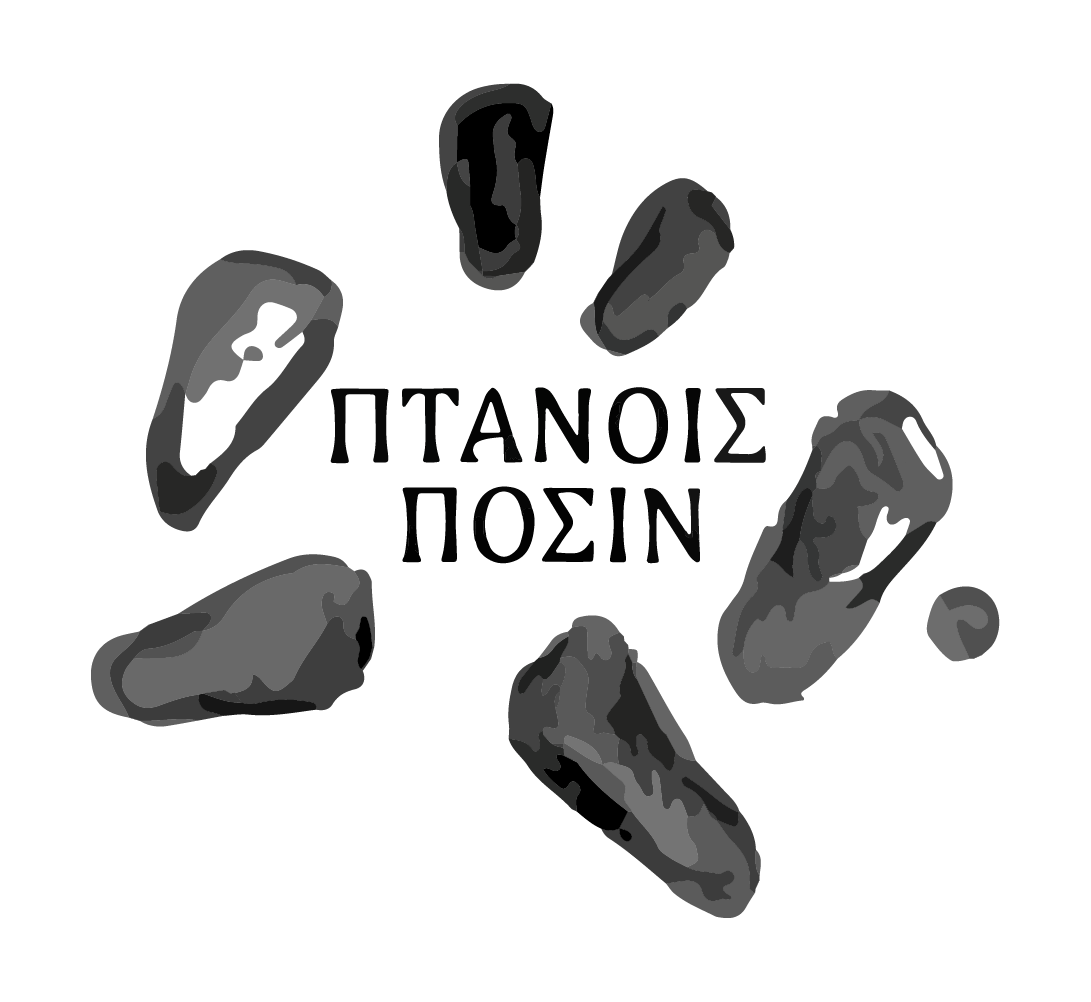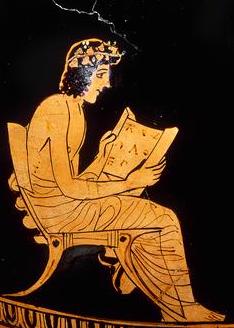FD III 3, 224
Hermokles from Chios, the son of Phainomenos: hymnographer and hieromnemon
Date:
end 3rd century BC
Edition:
[θεοί. ἔδοξε τᾶι πόλει τῶν Δελφῶν ἐν ἀγορᾶι τελείωι] σὺν ψάφοις ταῖς ἐννό[μοι]ς· ἐπειδὴ Ἑρμοκλῆς
[Φαινομένου ἀποσταλεὶς ἱερομνάμων ὑπὸ τᾶς πόλιος τῶ]ν Χίων τάς τε θυσίας τῶι θεῶι συνε̣τ̣έλεσ[ε]
[κὰτ τὰ πάτρια λαμπρῶς καὶ φιλοτίμως καὶ τὸν κρατῆρα ἐ]κέρασε τὸν ἀργύρεον τοῖς Θεοξενίοις καὶ ὕ-
[μνον γέγραφε τῶι θεῶι καὶ τὰν ἐπιδαμίαν ἐποιήσατο ἀ]ξίως τοῦ τε ἱεροῦ καὶ τῶν ἀποστειλάντων
5 [αὐτὸν καὶ ἐπελθὼν ποτὶ τὰν ἐκκλησίαν τὰν οἰκειότ]ατα τὰν ὑπάρχουσαν ἀπὸ Ἴωνος ἀπελογίξατο [ποτί τε τὸν θεὸν καὶ τὰν πόλιν· ἀγαθᾶι τύχαι· δεδό]χθαι τᾶι πόλει ἐπαινέσαι μὲν τὰν πόλιν τῶν
[Χίων ἐπί τε τᾶι λοιπᾶι αἱρέσει καὶ ἐπὶ τῶι ἀγωνίζεσθ]αι ὑπὲρ τᾶς κοινᾶς ἐλευθερίας ἐκτενέως κα[ὶ] [προθύμως καὶ στεφανῶσαι αὐτὰν δάφνας στεφάνωι τῶι] τοῦ θεοῦ καθὼς πάτριόν ἐστι Δελφοῖς ἀρ<ε>τᾶς ἕνεκ[α]
[καὶ εὐσεβείας τᾶς ἐν τὸ ἱερὸν καὶ τᾶς ποθ’ ἁμὲ εὐνοίας· σ]τεφανῶσαι δὲ καὶ αὐτὸν Ἑρμοκλῆν Φαινομένου
10 [Χῖον ἀρετᾶς ἕνεκα καὶ εὐσεβείας τᾶς ποτὶ τὸν θεὸν καὶ] τᾶς ποτὶ τὰν πόλιν εὐνοίας, ἀναγορεῦσαι δὲ τοὺ[ς]
[στεφάνους Πυθίοις ἐν τῶι ἀγῶνι τῶι γυμνικῶι καὶ Διο]νυσίοις, ἐπεί κα οἱ τῶν παίδων χόροι μέλλωντι [ἀγωνίζεσθαι· δεδόσθαι δὲ αὐτῶι καὶ ἐκγόνοις προξενί]αν, προμαντείαν, προδικίαν, ἀσυλίαν, ἀτέλει-[αν πάντων, προεδρίαν ἐμ πᾶσι τοῖς ἀγώνοις οἷς ἁ πόλις] τίθητι καὶ τἄλλα ὅσα καὶ τοῖς ἄλλοις προξέ-
[νοις καὶ εὐεργέταις· ἀναγράψαι δὲ τὸ ψάφισμα τόδε τ]οὺς ταμίας εἰς στάλας δύο καὶ ἀναθέμεν μ[ί]-
15 [αν μὲν ἐν Δελφοῖς ἐν τῶι ἱερῶι τοῦ Ἀπόλλωνος, τὰν δὲ ἑτέρα]ν ἐν Χίωι.
[ἁ πόλις τῶν Δελφῶν στεφανοῖ δάφνας στεφάνωι τὸ]ν ἱερομνάμονα Ἑρμοκλῆ Φαινομένου Χῖον.
Translations (en):
Gods. It was resolved by the city of Delphi, in full assembly, with legitimate vote: since Hermokles, the son of Phainomenos, who has been sent from the city of Chios as hieromnemon, celebrated the sacrifices for the god in a distinguished and honourable way, following the traditions of Delphi, he mixed the wine and water in the silver cup at the Theoxenia, he wrote a hymn for the god and stayed in our city in a way worthy of the sanctuary and those who sent him and, in front of the assembly, he showed the existing kinship starting from Ion: to good fortune, it was resolved by the city of Delphi to praise the city of Chios also for other aspects of his behaviour and to support the common freedom with fervor and zeal and to crown him with the laurel crown of the god as befits the Delphians, for the virtue, the devotion towards the sanctuary and the benevolence towards us and to crown him, Hermokles from Chios the son of Phainomenos, for the virtue, for the devotion towards the sanctuary and the benevolence towards the city, to proclaim the crowns at the Pythia during the athletic competition, and at the Dionysia, when the children’s choirs are about to compete; may he and his descendants have the proxeny, the right of priority in access to the oracle and in judgement, immunity for his possessions, exemption from payment of all taxes and privileged seating at all the festivals that the city organizes and all the other rewards granted to the other proxenoi and benefactors; the treasurers shall have this decree inscribed on two stelae, and shall have one of them placed in the sanctuary of Apollo and the other one in Chios. The city of Delphi crowns with a laurel crown the hieromnmemon Hermokles of Chios the son of Phainomenos.”
Translations (it):
“Dei. Sembrò bene alla città di Delfi, in assemblea perfetta, con voto legittimo: poiché Hermokles figlio di Phainomenos che fu mandato dalla città di Chio come ieromnemone celebrò in modo illustre e onorevole i sacrifici per il dio secondo i costumi patri, mescé il vino nel cratere d’argento ai Theoxenia, scrisse un inno per il dio e condusse il soggiorno in modo degno del santuario e di coloro che l’hanno inviato e, essendosi recato all’assemblea, espose per il dio e la città la parentela che esiste a partire da Ione; alla buona fortuna: è sembrato bene alla città di lodare la città di Chio anche per gli altri aspetti della sua condotta e per sostenere la libertà comune con fervore ed ardore e di incoronarla con una corona laurea del dio come è costume patrio per i Delfi per la virtù e la devozione verso il santuario e per la benevolenza nei nostri riguardi e di incoronare anche lui, Hermokles di Chio figlio di Phainomenos per la virtù e la devozione verso il santuario e per la benevolenza verso la città, di proclamare le corone ai Pythia durante l’agone ginnico e ai Dionysia quando i cori dei fanciulli si apprestano a gareggiare; sia concessa a lui e ai suoi discendenti, la prossenia, il diritto di precedenza nella consultazione dell’oracolo e in giudizio, l’immunità per i propri beni, l’esenzione dal pagamento di tutte le tasse la proedria in tutti gli agoni che la città bandisce e gli altri vantaggi quanti vengono accordati agli altri prosseni ed evergeti; i tesorieri facciano incidere questo decreto su due stele e si ponga una a Delfi nel santuario di Apollo, l’altra a Chio. La città di Delfi incorona con una corona di alloro lo ieromnemone Hermokles di Chio figlio di Phainomenos.”
Commentary (en):
The decree honoring Hermokles, hieromnemon of Chios and poet, is noteworthy as regards the poetic and public activities conducted in Delphi. His literary skills served as a tool the public office that he was called to hold in Delphi. During his stay, he wrote a hymn for the god and, in the celebrations of the Theoxenia, he was chosen to mix wine and water in the silver cup. Then, in front of the ekklesia, he held a speech on the kinship between the Delphians and the Ionians, recalling the figure and story of Ion and the mythic episode taking place in Delphi. It is remarkable that the Chians chose people with literary skills as hieromnemones at the sanctuary of Delphi: the poet Amphiklos as well (FD III 3, 217; IG XI 4, 572), epic poet who was granted proxeny in Delos for his artistic competences, was sent to Delphi as hieromnemon a few decades later.
Commentary (it):
Questo decreto per Hermokles, ieromnemone di Chio e poeta, offre diversi spunti di riflessione. La sua attività artistico-letteraria si intreccia con l’incarico pubblico che fu chiamato a svolgere a Delfi. Nel corso del suo soggiorno, compose un inno per il dio e alle celebrazioni dei Theoxenia gli fu affidato l’incarico di mescere il vino e l’acqua nel cratere d’argento. Davanti all’ekklesia, Hermokles tenne un discorso sulla parentela tra i Delfi e gli Ioni, sfruttando il personaggio di Ione e l’episodio mitico ambientato a Delfi. È degno di nota che questo poeta non sia stato l’unico letterato da Chio a rivestire la carica di eromnemone presso il santuario delfico: anche Amphiklos, poeta epico che ricevette la prossenia a Delo per le sue prestazioni artistiche, qualche decennio più tardi fu inviato a Delfi come ieromnemone.


